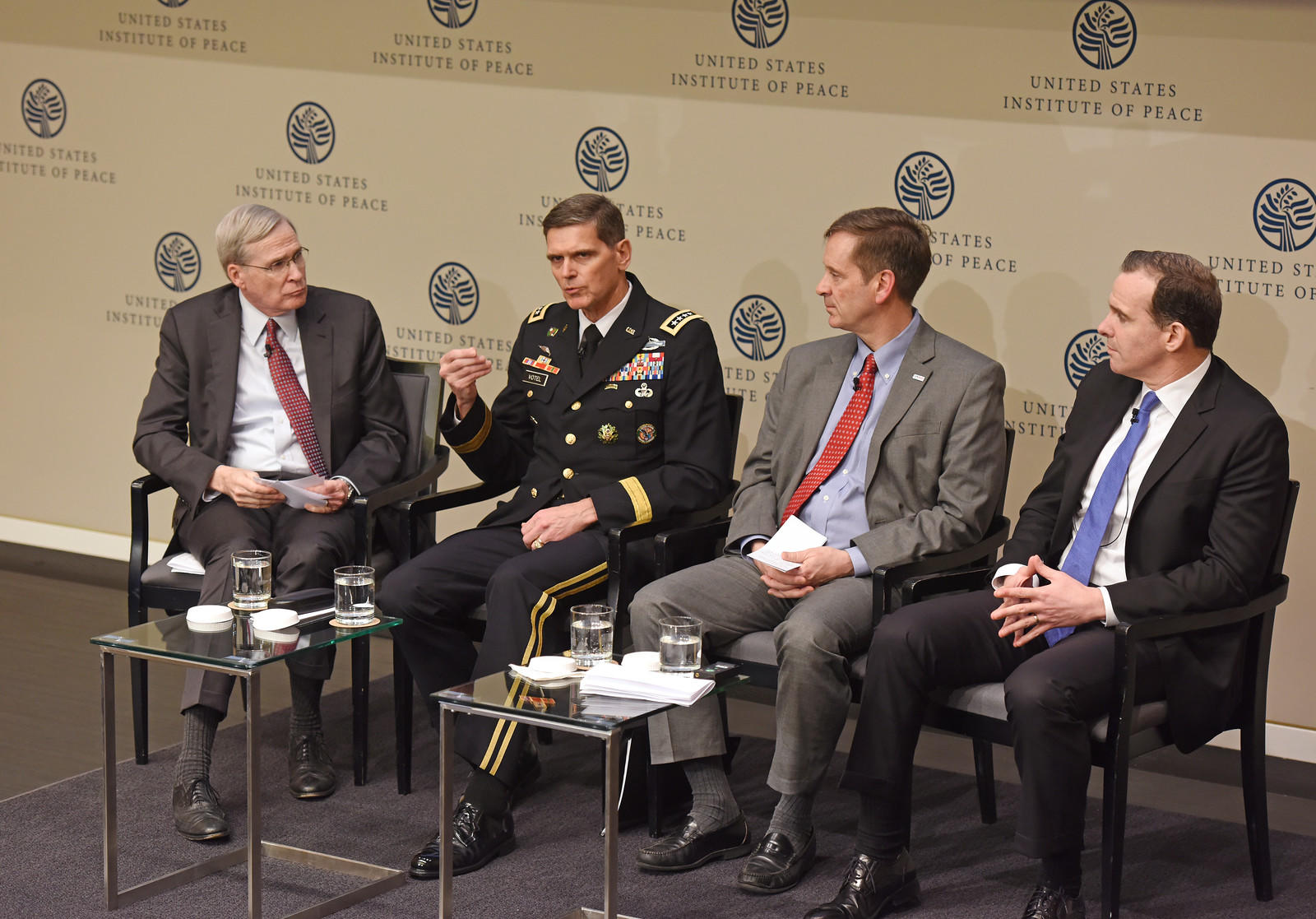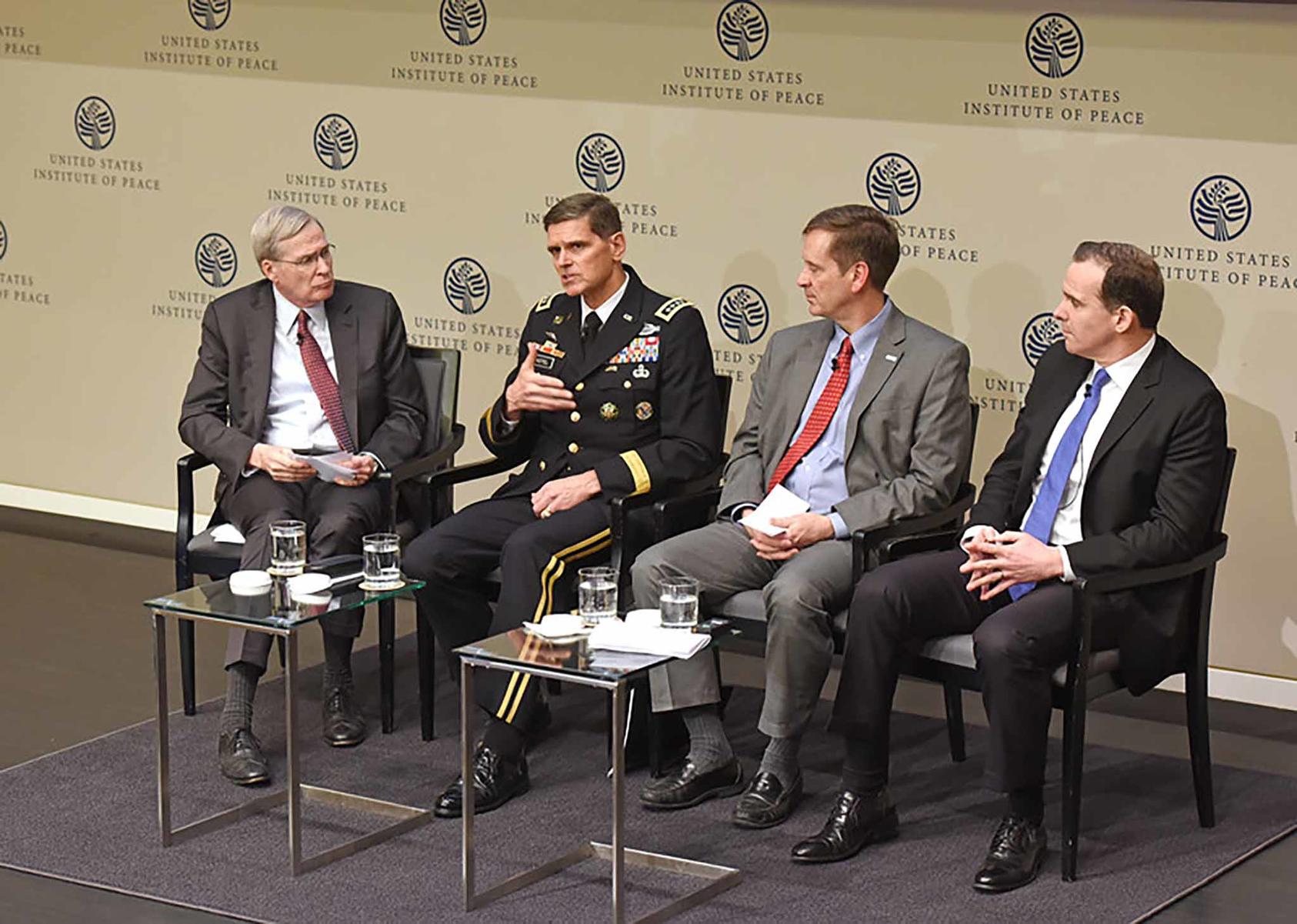Amid U.S. Suspension of Aid, Officials and Experts Lay Out Strategy for Security
With last year’s military rollback of the ISIS-declared caliphate, U.S. security and Middle Eastern stability require some way to establish governance in Iraq and Syria that meets the needs of their peoples, according to U.S. administration and military leaders, Iraqi officials and regional experts speaking on April 3 at USIP. During a day-long examination of strategy to stabilize the region and prevent a revival of ISIS, U.S. Special Presidential Envoy Brett McGurk said President Trump’s March 30 order to freeze spending on post-combat recovery efforts in Syria “is not hampering our work in the field.”

While McGurk and USAID Administrator Mark Green noted that U.S. stabilization operations are under review, “we are in Syria to fight ISIS,” McGurk said, “and our mission isn’t over.” The top U.S. military officer for the Middle East, Central Command Army General Joseph Votel, underscored the need for immediate, steady stabilization work to return millions of displaced residents to their homes and consolidate the military rollback of ISIS.
The officials spoke as President Trump told reporters of his desire to end the U.S. military role in Syria. USAID’s Green, the United States’ top foreign aid official, described the administration’s review of stabilization assistance, which was underway before the president’s suspension of spending on that work in Syria. “In coming weeks, the administration will finalize and roll out the first-ever, multi-agency framework for those issues that we’re discussing on stabilization,” Green said. “It’s called the Stabilization Assistance Review, and it’s built upon the lessons that we’re learning in Syria, Iraq, but also, quite frankly, a number of other places—the work that we’ve been doing over the last decade or so.”
Current U.S. and coalition efforts in Iraq and Syria follow “a ruthlessly prioritized approach” to achieve a first need for stabilization: “getting people back into their homes,” McGurk said. As such, all efforts are targeted at fundamental tasks like opening streets and roads by clearing rubble, restoring basic electrical and water service, and clearing mines and bombs left by ISIS.
McGurk said the campaign includes an “emphasis, also, particularly coming from the president, on burden-sharing.” He noted recent pledges of help for Iraq from Saudi Arabia and other Gulf countries, adding, “In Iraq, about 80 percent of the humanitarian assistance resources come from the Iraqi government.”
Military Gains Trigger Stabilization Needs
With U.S. forces aiding Iraq’s army to confront ISIS, “we’re probably six to eight months ahead of where we had anticipated on being,” Votel said. That fast military advance can pose a risk of outstripping the other elements necessary for overall success, he told an audience of policy specialists, journalists and officials.
Military professionals are cognizant of “the military and security situation getting out in front of the rest of the lines of … effort that have to stay paced with this,” Votel said. The campaign against ISIS has required “that our military planning was very closely aligned to our development and stabilization planning and humanitarian aspects … as well with as the political planning,” the general noted.
A vital part of keeping Iraq stable after ISIS has been a series of local peace accords—in Tikrit, Hawija, Yathrib and other locales—among tribal or factional leaders to avert revenge attacks. Those local peace processes have been led by Iraqi mediators trained and supported by USIP.
Votel and other officials and analysts agreed that the stabilization of post-ISIS Iraq—critical to prevent a revival of the extremist movement—will be a more exacting task than the military fight. “It is the stabilization, it is the bringing back of governance … [that] is much more challenging in the long run,” Votel said.
Syria remains a tougher case because of the complex conflict among Syrian factions, plus the involvement of Russia, Iran and Turkey as well as the United States, Votel said. “Obviously, everyone is aware of what is happening along the border … in Afrin,” the Syrian town taken over by Turkish forces who oppose Syria’s ethnic Kurdish fighters operating near the frontier. That movement “has … slowed down our operations against ISIS as our principal partner on the ground [a Syrian force composed partly of Kurdish fighters] has … begun to address that.” Votel urged “discussions and diplomacy as opposed to fighting” among the various forces confronting ISIS, which continues to hold remote pockets in Syria.
Syria Withdrawal?
“We are at a very dangerous moment on the ground in Syria and at the same time … we are at this critical inflection point with respect to U.S. policy,” said USIP’s Mona Yacoubian. “If, in fact, we do precipitously pull out from Syria, I think that will have a significant impact on our ability to sustain the wins against ISIS so far and more importantly help stabilize” the region.
Trump’s inclination to leave Syria quickly is “great news for Iran’s leadership,” said Alireza Nader, a senior researcher at RAND. It contradicts the administration’s stated goal of checking Iranian influence in the Middle East, he said. A U.S. withdrawal would reduce pressure on the regime, which now faces unrest and demonstrations in part over the cost of its foreign interventions.
Mark Katz, a Russia specialist at George Mason University, said Moscow favored U.S. involvement in northern Syria, even as Russian forces support the Assad regime. U.S. backing for Kurdish forces fighting ISIS, and Turkey’s incursion in response, creates an opportunity Russia can exploit, he said. “If there is any cunning behind the decision to withdraw U.S. forces, it’s perhaps with the idea that it might promote Russian-Iranian discord,” Katz said. Still, “it’s not going to lead to all-out struggle between them,” he said.
Can Iraq’s Vote Enhance a Sense of Unity?
Iraq’s defeat of ISIS has helped forge a greater sense of national purpose that should be cultivated in what is a critical election season, according to Iraq’s ambassador to the U.S., Fareed Yasseen, and Bayan Sami Abdul Rahman, the Kurdistan Regional Government’s representative in Washington.
“In a strange way, ISIS brought us together,” said Yasseen, engaging the nation’s nascent army and disparate factional armed forces against a common foe.
Now, as Iraq prepares for a May 12 parliamentary election, public “debate is shifting from identity politics to issue politics,” Yasseen said. He ticked off the names of new parties that stress nationalism and citizenship. “It is a really good sign.”Rahman voiced hope that “these elections create an opportunity for a new chapter,” and said Kurdish parties will participate and hope to join a new government. The central government in Baghdad and the Kurdistan Regional Government have been locked in a struggle over territorial control, political power and the sharing of economic resources, posing risks to Iraq’s post-ISIS stabilization.
Iraqis’ weariness of warfare after 15 years is part of shift in public sentiment toward resolving the country’s factional conflicts, said USIP’s Sarhang Hamasaeed, who has overseen the Institute’s reconciliation work in Iraq. “People are trying to turn to solutions,” he said. While the vote will take place amid strengthened nationalist sentiments, especially outside the Kurdistan Region, the election’s impact on Iraq’s stabilization remains unclear. For the election to improve Iraq’s stability, the vote will need to reflect a strong turnout and yield an inclusive government that can deliver for the people, Hamasaeed said.
Any retreat from Iraq by the international community following the vote will undermine Iraqis’ hopes and squander an opportunity to preserve stability, he said. Likewise, any sudden withdrawal of U.S. forces from Syria—a possibility raised by recent statements from President Trump—would send a frightening message to Iraqis, Rahman said.
